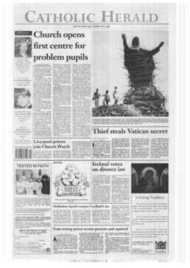Page 3, 24th November 1995
Page 3

Report an error
Noticed an error on this page?If you've noticed an error in this article please click here to report it.
Tags
Share
Related articles
Anger Over Divorce Law
Australian Bishop Attacks Family Law Bill
Divorce Law Plan 'doorway To Evil' Say Spanish Bishops
Battle Over Divorce Bill
Ni Divorce Reform
Bishop attacks Government divorce plans
By Jot! JENKINs BISHOP PETER Smith has attacked Parliament for its adversarial style of debate and its handling of the forthcoming Family Law Bill, which will amend existing legislation on divorce and domestic violence.
Speaking after last week's Bishops' Conference of England and Wales, Bishop Smith, chairman of the Conferences Committee of Marriage and Family life, said: "Calmness and reason are required. Fair and honest reports must be listened to before any decision can be arrived at. Our Parliament is just not suited to this kind of debate.
"It is a scandal how diatribes and personal abuse are allowed to creep into the debate".
The Bishops' Conference statement on Marriage and Divorce, issued last week, described the reality of marriage as a "temporary union" rather than the Church ideal of "a commitment for life".
But the conference welcomes the Bill's proposal to bring an end to the six month 'quickie' divorces first proposed by the Lord Chancellor.
"Even bishops might disagree amongst themselves over the contents of the bill" said Bishop Smith, "but we do not condemn Catholics seeking divorce when it's the only way."
The bishops attacked Government proposals for a `fast track' to self-government for Church schools. They described the proposals as "discriminatory devices", for their singling out of voluntaryaided schools for special treatment.
"The cost of establishing the new self-governing schools, as taken from the main education budget, would mean less funding for other maintained schools and would exacerbate the present under-resourcing of education", the conference announced.
It also expressed its appreciation for the Government's continuing support for Church Schools, but was critical of the Government because it could not see any educational reasons for the special route to grant maintamed status.
"These proposals isolate the churches from their partners in education and this we deeply regret."
The conference also issued a joint statement with the National Board of Catholic Women, in the hope of raising awareness of what Pope John Paul II, in July's Letter to Women, called "The Long and Degrading Underground History of Violence Against Women".
The Conference expressed support for the International Day of Action Against Violence Against Women (25 November) and echoed the final document of September's Beijing Conference.
This document urged that high priority be given to any measures that could provide security for women against violence, be it physical, sexual, psychological or moral.
In their statement on Europe, the bishops stressed the importance of next year's inter-governmental Conference which will review development in Europe since Maastricht.
The tone of the statement is markedly pro-Europe. Just as John Paul 11 on a visit to Strasbourg in 1991 encouraged Catholics to be good Europeans, the Bishops' Conference suggests that working together in Europe is preferable to working apart.
"It is essential that we recognise the achievements of Europe.
"The European community was sounded out on the concerns for peace and justice in Europe and reflects the Church's own concern for freedom and security, founded on concern for human dignity and the unity of humanity as a whole," said the Conference.
"The Church has constantly to respond to historical change. It cannot remain outside history; we necessarily share in the making of history. Europe is at a cross-roads.
"As a Church, we have a spiritual contribution to make: we must at the heart of Europe be helping to shape it as it evolves, so that we will feel proud to be part of the Europe of the future".
blog comments powered by Disqus













